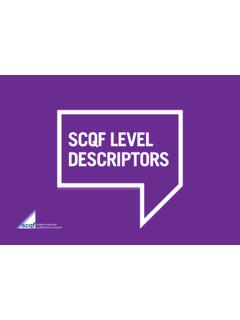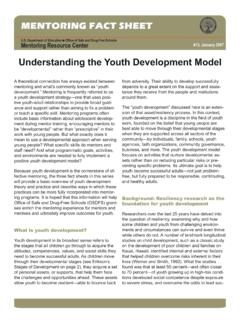Transcription of Trainer Manual for Soft Skills - WUSC Resources
1 Trainer Manual for soft Skills applied in Entry Level Occupations (To deliver soft Skills in conjunction with the course technical curriculum, NVQ II - IV) Important - This document should be used to deliver soft Skills by the instructors in conjunction with the course Technical Curriculum and the soft Skills Curriculum 1 Contents Page 01 Foreword 2 02 Acknowledgment 3 03 Introduction 4 Module Numbers and Modules including Reference Material 04 M 01. Communication Skills 5-12 05 M 02. Team building & leadership 13-17 06 M 03. Time management 18-23 07 M 04. Personality, professionalism and work ethics 24-30 08 M 05. Problem solving 31-36 2 Foreword The practical integration of soft Skills into vocational training courses has proven to be difficult to consistently achieve in the past.
2 While private sector employers often compliment the technical Skills of trainees graduating from certified Skills training courses, they have found graduating trainees employment related soft Skills to be very poor. Given this, the Government of Canada funded WUSC ASSET project undertook an initiative to develop soft Skills modules for partner vocational training centers to integrate into training. This was done in close collaboration with industry/private sector employers and vocational training partners. A series of discussions with key stakeholders, including key government bodies, were held to formally develop the framework for a curriculum for soft Skills and a soft Skills Trainer Manual targeting entry-level vocational training programs/trainees up to the National vocational Qualification (NVQ) Level 4.
3 A Training of Trainers (TOT) program was conducted to train instructors attached to ASSET vocational training providers on how to use the soft Skills curriculum documents in conjunction with the technical curriculum of Skills training courses. A practical approach for the delivery of soft Skills training was promoted. The TOT program for instructors has now been piloted through two TOT programs, one in Sinhala and one in Tamil medium. This curriculum comprises of five modules covering: 1. Communication Skills ; 2. Team building & leadership; 3. Time management; 4. Personality, professionalism and work ethics; and 5. Problem solving. The Tertiary vocational Education Commission (TVEC) has approved the modules and is now including the module in NVQ Level 1 to 4 National Competency Standards.
4 Piloting and testing in registered vocational training institutions has been completed. We trust that this collaboration will enhance the quality of Skills training programs in Sri Lanka and that important soft Skills will improve the employability of female and male youth entering the skilled labour market in Sri Lanka. Yours truly, Doug Graham Country Director WUSC Sri Lanka WUSC ASSET Project March 2019 3 Acknowledgement Overall Direction Ms. Esther M. McIntosh Former Country Director, WUSC ASSET Project Mr. Doug Graham Country Director WUSC Sri Lanka WUSC ASSET Project Mr. Deepthi Lamahewa Deputy Program Director, WUSC ASSET Project Technical Support Mr. S. U. K. Rubasinghe (Master Trainer ), Director (NVQ, NCS & Curricula TVEC) Mr.
5 Sivasubramaniam Muguntthan, Vice President, Institution of Professional Development for Teachers (IPDT), Jaffna Mr. D. M. Yahampath (Master Trainer ), Assistant Director (Staff Development), vocational Training Authority of Sri Lanka Mr. A. L. M. Imam (Master Trainer ), vocational Training Authority of Sri Lanka Mr. C. R. Samaraweera, Freelancer (TVET Sector) Mr. W. Denzil Fernando, Manager Skills for Employment, WUSC ASSET Project Facilitator/Coordinator Mr. W. Denzil Fernando, Manager Skills for Employment, WUSC ASSET Project Administrative Support Ms. Gowri Ravishanker, Senior Finance Manager, WUSC ASSET Project 4 Introduction soft Skills are in high demand among private sector clients and youth themselves. During WUSC ASSET final fiscal year, the soft skill packages used by different partners were reviewed and finalized a common content by having regional level consultative meeting to accommodate the requests made during meetings and private sector industries specific content.
6 Based on the content of the soft Skills curriculum, this soft Skills Trainer Manual was developed by a group of consultants. The training delivery package is consisted of the soft Skills modules for each and every soft skill area including this Trainer s Manual , student activities and reference material developed. This soft Skills Trainer Manual should be used in conjunction with the course technical curriculum and the soft Skills curriculum to deliver soft Skills . The course instructor should identify the appropriate module/task no in the technical curriculum to match the topics given under the content pages of this soft Skills Trainer Manual . He/she can follow the mode of delivery, activities and assessment guide given in this Trainer Manual .
7 Instructor is free to choose any additional activities related to soft Skills delivery to match the module/tasks in the technical curriculum. Instructors are advised to prepare a separate scheme of training (T2 form) for each and every soft Skills module. An awareness program or a TOT should be planned and delivered under the guidance of TVEC by the respective officer in charge of staff training in the VT institutions. 5 soft Skills Trainer s Manual Module No: 01 Module Title: Communication Skills Importance of the Module: The trainee has to communicate effectively and efficiently with the instructors and colleagues in the training centre and customers, supervisors and co-workers in the workplace. Effective communication will improve the interpersonal relationship, productivity and minimize conflict.
8 You will need to request information, discuss problems, give instructions, work in teams, and interact with colleagues and clients. If you are to achieve co-operation and effective teamwork, good human relations Skills are essential. Everything you do in the workplace, results from communication. Therefore good reading, writing, speaking and listening Skills are essential if tasks are going to be completed and goals to be achieved. In following occasions in your career you will find various reasons why successful communication Skills are important. To secure an interview and get the job To do your job well To advance in your career Content Ref. no Topic Appropriate module/task no. in the technical curriculum 1. Different types of Communication o Verbal communication Oral communication Written communication o Non-verbal communication 2.
9 Body language and platform Skills 3. Internet & e-mail communication 4. Communication etiquettes 5. Barriers to communication 6. Effective listening Skills o Types of listening 7. Effective presentation 8. Effective communication Skills 6 Mode of delivery: This module will be delivered throughout the course as a supporting document for soft Skills delivery and to be used along with the technical curriculum modules/tasks. After the each activity teacher has to give feedback based on above topics. Activities: 1. Make a presentation by each students on subject matter learnt on rotational basis 2. Request student to maintain summarized weekly note book 3. Fill forms related to work environment, make written request for leave 4. Search related job vacancy in news papers/gazette/any electronic media and prepare application/CV 5.
10 Teacher has to give feedback and maintain students performance record Assessment guide: When a task is assessed in the technical curriculum consider the performance of the trainee related to soft Skills too. During the formative assessment instructor has to give feedback and maintain students performance record. Reference material/Supporting Resources : Communication What is Communication? What does it mean to you? The process of communication is what allows us to interact with other people; without it, we would be unable to share knowledge or experiences with anything outside of ourselves. Common forms of communication include speaking, writing, gestures, touch and broadcasting. Wikipedia definition Communication is a process of exchanging information, ideas, thoughts, feelings and emotions through speech signals, writing or behavior.





